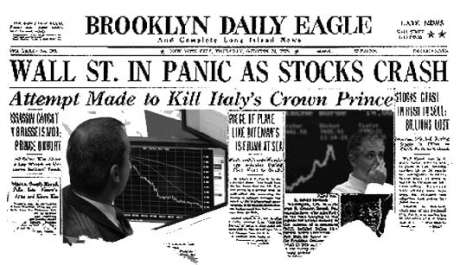“We’re going through uncharted territory now”.
 international |
anti-capitalism |
news report
international |
anti-capitalism |
news report  Tuesday January 22, 2008 14:35
Tuesday January 22, 2008 14:35 by S.Cat
by S.Cat
Us Federal Reserve makes shock announcement as Wall St opens.
At around lunchtime in Europe, when we're grabbing sandwiches or sitting down to plates of pasta or green salads (or skulling pints in the Stag's Head) the financial markets in Wall Street open. Usually they react to the morning's trading in the European markets, and so US traders seeing falling prices as a buying opportunity can offset a downward trend. Yesterday however, the holiday for Martin Luther King meant the falls on the global markets went from bad, to worse, to unbelievably bad, while in America the boys in the sharp suits were at home celebrating racial diversity and civil rights.
India’s stock index sank by 7.4 percent yesterday, the greatest one-day fall ever. Tokyo's Nikkei 225 index slid by 3.9 per cent. In Toronto, the S&P/TSX composite index fell 4.8 percent. Brazilian stocks plunged 6.6 percent on the main index of the Bovespa exchange, and the Argentinian Merval index fell 6.3 percent. In London the FTSE-100 fell 5.5 percent, in Paris the CAC-40 Index went down 6.8 percent, and in Germany DAX 30 fell 7.2 percent.
In Hong Kong, the Hang Seng index was down 5.5 percent, its biggest percentage drop since somebody flew some planes into some buildings in New York and Washington six or seven years ago.
These figures are very bad for the markets. They mean that the value of companies is diminishing, so what they can borrow is less than they thought. So then they might run in to cash flow problems, and can't expand or take risks. So then people don’t want to invest in them, so the cycle turns in a vicious circle.
Of course, from an environmental or anti-capitalist point of view, these are all good things, since the companies like Cement Roadstone (down by 98 cents per share yesterday) which are getting hit, do not have the best interests of anyone but their shareholders at heart, so the less damage they can do (to us, and the ecosphere) the better.
The whole capitalist money market system on based on a belief that there is a never-ending supply of market, resources, consumers, products and money. But everyone knows that there have to be losers as well as winners, and everything runs out eventually. So the market falls, people lose their shirts, there are more poor people than rich people in the world, but generally the people with the money are good at getting more of it, so whatever happens they come out alright. Some lose their second homes or yachts, some end up jumping out the window, but the strongest (meaning the richest in this system) survive.
Usually there is a balance in these things, where slack can be picked up and bargains can be had. In recent years however, the decline in trust between banks and the general disdain felt for the traders since the back office boys realised that they no longer really understood what is actually going on in the trades (the recent "credit crunch" meant that a lot of senior people were found to have not figured that they were actually buying mortgages held by poor Americans in housing estates in places like Chicago, at rates which depended on housing increasing in value forever to infinity). Banks no longer trust each other and in lots of cases, they don't even trust their own people. When trust leaves the financial markets, the price of borrowing goes up. When money becomes scarce, prices drop to attract whatever is available to invest. In this case it's share prices that are dropping. Within the last hour or so, the US Federal Reserve has suddenly raised interest rates in an effort to attract money back.
So what does this mean for us?
In the short term, people in Ireland may lose their jobs because the American companies, which employ them, will not be able to borrow cheaply. The Irish tax take will fall (they won't be paying tax on money they are not making) and public spending will be hit. A sharp slowdown will affect house prices. Mortgages that can't be repaid will result in negative equity (people living in houses that they can't pay for but can't sell without going into more debt). Ministers will make noises about tightening belts while making sure their own pensions are okay.
In the long term, no one knows what will happen.
In a news report of the market falls yesterday, Robert Lutz, chief investment officer for Salem’s Cabot Money Management Inc., was asked what he thought was going to happen in Wall St today, but in his answer he could have been talking about the future for the whole global capitalist experiment:
“I think you’re going to have a very volatile day,” he said. “We’re going through uncharted territory now”.
